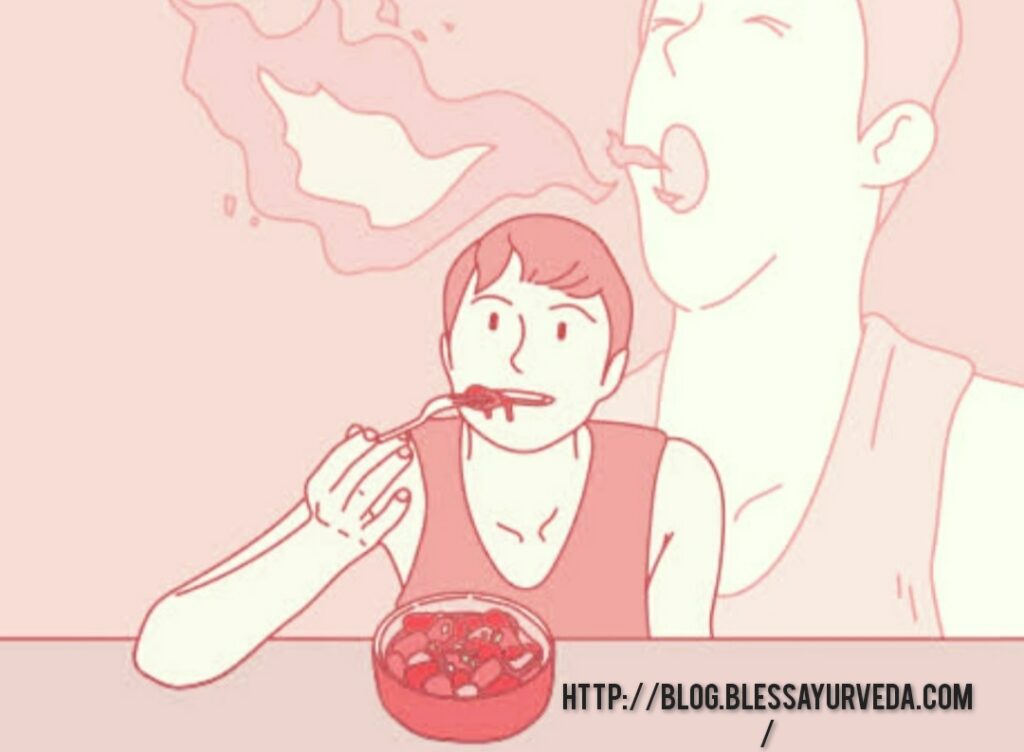Most of the Indians have a tendency to gorge on the spicy food. Gastrointestinal disorders have become lifestyle maladies due to the shifting of eating pattern toward ready-to-eat commercial spicy food from homemade food. The spices and additives like chilly, clove, mustard, garlic, cinnamon etc. if used excessively, can cause irritation to the gastric mucosa.
Such lifestyle is adversely affecting the quality of life of the people affecting physical and mental health. The long-term effects can also lead to poorer quality of life.
In Ayurveda, it has been mentioned that excess consumption of Vidahi Annapana (foods which cause burning sensation) is a cause of Amalpitta (hyperacidity).
Excess consumption of Spicy food causes Tikshnaagni. Tikshanaagni causes excess secretion of gastric juice, which irritates the gastric mucosa due to the vitiation of Pachak Pitta and Kledaka Kapha.
According to Ayurveda, consumption of spicy food can vitiate Pitta dosha in the body. It causes the formation of Amalpitta (hyperacidity).

The cardinal features of Amalpitta are:
- Haritkantha Daha (heart and throat burn)
- Amlodgara (sour and bitter belching)
- Aruchi (tastelessness)
- Avipaka (indigestion)
- Vibheda (diarrahoea)
- Hritshula (chest pain)
Intake of spicy food causes the vitiation of Pitta and Vata doshas. Pitta dosha along with Vata or Kapha dosha diminishes the Jatharagni (digestive fire) and causes Jatharagnimandya (weak digestive fire).
As a result, the spicy food turns into Shukta (acidified). At this stage, Vidagdhajirna (indigestion caused due to acidified chyle) manifests which is the initial stage of amalpitta.
Further, vitiated Pitta gets mixed with Shukta and causes Pitta Amavisha Sammurchhana (combination of non-metabolized Rasa and undigested food).
This condition finally causes Amalpitta.
How Ayurveda can help in managing hyperacidity due to the intake of spicy food?
The Ayurvedic treatment of Amalpitta includes herbs that have:
- Tikta-Madhur Ras (bitter-sweet taste)
- Sheeta veerya (cold potency)
- Laghu (light)
- Ruksha Guna (dry in quality)
Some Ayurvedic formulations useful in the treatment of Amalpitta are:
All Ayurvedic formulations that are used for Amalpitta have Pitta Shamak property and Vata and Kapha balancing in nature. These formulations work on the digestive system and smoothen the activity of every organ of digestive system in a natural way without causing any side effects.
- Avipattikar Churan: It acts as an acid neutralizer, mild laxative and increases digestive fire.
- Kamdudha Ras: Kamdudha Ras has a cooling potency which alleviates burning sensation and mitigates heat in the body. It is a potent antacid.
- Avipattikar Churan: It acts as an acid neutralizer, mild laxative and increases digestive fire.
- Kamdudha Ras: Kamdudha Ras has a cooling potency which alleviates burning sensation and mitigates heat in the body. It is a potent antacid.
- Chitrakadi Vati: Chitrakadi Vati helps in the reduction of Ama by digesting the undigested food particles and removes accumulated toxins in the body due to malabsorption of food particles thus further improving digestion and metabolism of the body.
- Shankh Bhasam: Shankh Bhasam is a natural calcium carbonate which has acid-neutralizing property.
- Prawalpanchamrit Ras: Another effective remedy to deal with amalpitta.
Diet and Lifestyle:
- Avoid the foods that cause hyperacidity.
- Drinking fresh coconut water is very beneficial.
- Fruits such as pomegranate juice, banana and apple are ideal.
- Consuming cow ghee calms Pitta and improves digestion.
- Avoid direct exposure to sunlight.
- Drink rose, hibiscus or chamomile tea.
- Gulkand Or rose petal jam is quite effective.
- Goondkatira water is also helpful to relieve burning feeling.
The dosage and duration of herbal formulations differ from person to person depending on the condition so it is advised to consult an Ayurvedic physician for proper treatment.
Disclaimer:-
This article is not a substitute to the standard Medical Diagnosis or personalized Ayurvedic Treatment! It is intended only for Information!
For experts consultation, please write us at care@blessayurveda.com.
1,479 total views, 5 views today